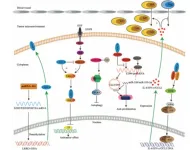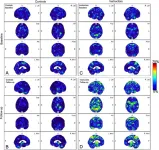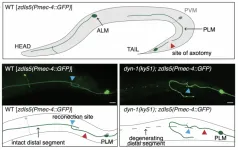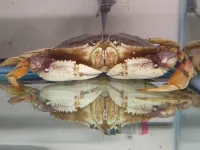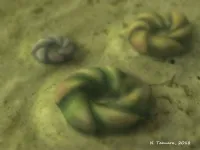(Press-News.org) Researchers from Aston University and the University of York have discovered new insights into how the human brain makes perceptual judgements of the external world.
The study, published on 8 May in the journal PLOS ONE, explored the computational mechanisms used by the human brain to perceive the size of objects in the world around us.
The research, led by Professor Tim Meese, in the School of Optometry at Aston University and Dr Daniel Baker in the Department of Psychology at University of York, tells us more about how our visual system can exploit ‘defocus blur’ to infer perceptual scale, but that it does so crudely.
It is well known that to derive object size from retinal image size, our visual system needs to estimate the distance to the object. The retinal image contains many pictorial cues, such as linear perspective, which help the system derive the relative size of objects. However, to derive absolute size, the system needs to know about spatial scale.
By taking account of defocus blur, like the blurry parts of an image outside the depth of focus of a camera, the visual system can achieve this. The maths behind this has been well worked out by others, but the study asked the question: does human vision exploit this maths?
The research team presented participants with photographic pairs of full-scale railway scenes subject to various artificial blur treatments and small-scale models of railway scenes taken with a long exposure and small aperture to diminish defocus blur. The task was to detect which photograph in each pair was the real full-scale scene.
When the artificial blur was appropriately oriented with the ground plane (the horizontal plane representing the ground on which the viewer is standing) in the full-scale scenes, participants were fooled and believed the small models to be the full-scale scenes. Remarkably, this did not require the application of realistic gradients of blur. Simple uniform bands of blur at the top and bottom of the photographs achieved almost equivalent miniaturisation effects.
Tim Meese, professor of vision science at Aston University, said: "Our results indicate that human vision can exploit defocus blur to infer perceptual scale but that it does this crudely – more a heuristic than a metrical analysis. Overall, our findings provide new insights into the computational mechanisms used by the human brain in perceptual judgments about the relation between ourselves and the external world."
Daniel Baker, senior lecturer in psychology at the University of York, said: "These findings demonstrate that our perception of size is not perfect and can be influenced by other properties of a scene. It also highlights the remarkable adaptability of the visual system. This might have relevance for understanding the computational principles underlying our perception of the world. For example, when judging the size and distance of hazards when driving.”
END
New research sheds light on how human vision perceives scale
Researchers from Aston University and the University of York have discovered new insights into how the human brain makes perceptual judgements of the external world.
2023-05-09
ELSE PRESS RELEASES FROM THIS DATE:
Chinese Medical Journal article reviews role of gene involved in brain functions and disorders
2023-05-09
Leucine-rich repeats containing 4 (LRRC4)—a gene abundantly found in the brain and located on human chromosome 7q31–32—plays a pivotal role in memory formation, autism, spinal cord injury, as well as in determining the malignant potential, development, and progression of glioblastoma (GB), an aggressive cancer involving the brain and/or spinal cord. In a review article published (in volume 136 issue 1 on 5 January 2023, and online on 10 February 2023) in the Chinese Medical Journal, researchers shed light on the ...
EuroPCR 2023 – The interventional cardiovascular community is gathering in Paris to learn, share, and shape the future of patient care worldwide
2023-05-09
EuroPCR, the annual world-leading Course in interventional cardiovascular medicine, has been taking place for over 30 years. It is tailored for all those dedicated to the sharing of knowledge and skills, and improvement of patient care worldwide: interventional cardiologists, cardiac surgeons, imaging specialists, radiologists, nurses, allied professionals and other practitioners, as well as researchers, innovators and industry representatives. The 4-day meeting addresses interventions for coronary and peripheral vessels, for the structural heart including valves, for hypertension, heart failure and stroke, while keeping the community up ...
Spanish courts hand down milder sentences for rapes if they are committed by the victim's partner or ex-partner
2023-05-09
Just four years ago, the Spanish Supreme Court pointed out in a ruling that there is no such thing as a 'conjugal debt'. In other words, a woman is not obliged to satisfy her husband's sexual needs. It may come as a surprise that this point still needs to be made, but the statistics speak for themselves. According to a national survey carried out in 2019, 7.5% of Spanish women over 16 years old have been raped by their partners or ex-partners.
These rapes are usually subject to less attention, and they tend to be "perceived as something less serious". So says Josep Maria Tamarit Sumalla, a full ...
Recurrent brain trauma may increase Alzheimer’s risk
2023-05-09
OAK BROOK, Ill. – New research finds that the brains of otherwise healthy military personnel who are exposed to explosions show an abnormal brain accumulation of amyloid-beta protein—a protein that plays a role in the development of Alzheimer’s disease. The results of the study were published today in Radiology, a journal of the Radiological Society of North America (RSNA).
Research over the last several decades suggests that there might be a relationship between repetitive or severe traumatic ...
A key protein for repairing broken nerves
2023-05-09
A study explores the role of the dynamin protein DYN-1 in axonal fusion. The axon is a long, thin protrusion of nerve cells that carries electrical impulses. Severed axons can be repaired by a highly efficient regrowth process known as axonal fusion. Previous research has shown that molecules involved in apoptosis—programmed cell death—are also involved in axonal repair. Because dynamin is involved in apoptosis, specifically in the recognition of dying cells, Brent Neumann and colleagues posited that dynamin might also be involved in axonal repair. The team severed axons in the model organism Caenorhabditis elegans, a multicellular nematode worm with just a few hundred ...
Crab populations are crashing. Could losing their sense of smell be one of the important reasons why?
2023-05-09
A new U of T Scarborough study finds that climate change is causing a commercially significant marine crab to lose its sense of smell, which could partially explain why their populations are thinning.
The research was done on Dungeness crabs and found that ocean acidification causes them to physically sniff less, impacts their ability to detect food odours and even decreases activity in the sensory nerves responsible for smell.
“This is the first study to look at the physiological effects of ocean acidification on the sense of smell in crabs,” says Cosima Porteus, an assistant professor in the department of ...
Program Announced for NUTRITION 2023 to be held July 22–25 in Boston
2023-05-09
How do our genes affect what we eat? Can more sustainable diets also improve health? What are the best foods for living longer, fighting cancer, and staying mentally sharp as we age?
You’ll find the answers to these questions and more at NUTRITION 2023, the annual flagship meeting of the American Society for Nutrition. Join us July 22-25 in Boston for an exciting lineup of scientific symposia, educational sessions, hot-topic discussions, and award lectures covering the latest developments in nutrition science.
Get a sneak peek at the ...
NYC Media Lab partners with Verizon to release free immersive educational content available to all US-based educators
2023-05-09
BROOKLYN, NEW YORK (May 9, 2023) — Today, the NYC Media Lab announced the availability of new immersive educational content for all US-based educators. Developed in partnership with Verizon for the $1M Museum Initiative, over 50 augmented reality (AR)- and virtual reality (VR)-focused lesson plans are available on Verizon Innovative Learning HQ (verizon.com/learning)—the free online education portal that brings next-gen learning to all.
Through the $1M Museum Initiative—a nationwide open call for museums and cultural institutions to develop ...
A new theory of what drives partisan conflict and hostility
2023-05-09
COLUMBUS, Ohio – Partisan conflict can be largely explained as differing views on two crucial tasks of society, according to a new theory developed by a pair of prominent social scientists.
In a new article published yesterday (May 8, 2023) in the journal Psychological Inquiry, Roy Baumeister and Brad Bushman say societies flourish by both amassing and distributing resources.
Conservatives focus on amassing resources, while liberals concentrate on distributing resources. The problem is both sides increasingly tend to disparage the value of what the other side champions, the authors said.
“Both tasks are absolutely essential for society,” ...
Earth’s first animals had particular taste in real estate
2023-05-09
Even without body parts that allowed for movement, new research shows — for the first time — that some of Earth’s earliest animals managed to be picky about where they lived.
These creatures from the Ediacaran Period, roughly 550 million years ago, are strangely shaped soft-bodied animals that lived in the sea. Researchers have long considered them enigmatic.
“It’s not like studying dinosaurs, which are related to birds that we can observe today,” said Phillip C. Boan, UC Riverside paleontology graduate student and lead author of the new study. “With these animals, because they have no modern descendants, we’re ...
LAST 30 PRESS RELEASES:
Scientists identify smooth regional trends in fruit fly survival strategies
Antipathy toward snakes? Your parents likely talked you into that at an early age
Sylvester Cancer Tip Sheet for Feb. 2026
Online exposure to medical misinformation concentrated among older adults
Telehealth improves access to genetic services for adult survivors of childhood cancers
Outdated mortality benchmarks risk missing early signs of famine and delay recognizing mass starvation
Newly discovered bacterium converts carbon dioxide into chemicals using electricity
Flipping and reversing mini-proteins could improve disease treatment
Scientists reveal major hidden source of atmospheric nitrogen pollution in fragile lake basin
Biochar emerges as a powerful tool for soil carbon neutrality and climate mitigation
Tiny cell messengers show big promise for safer protein and gene delivery
AMS releases statement regarding the decision to rescind EPA’s 2009 Endangerment Finding
Parents’ alcohol and drug use influences their children’s consumption, research shows
Modular assembly of chiral nitrogen-bridged rings achieved by palladium-catalyzed diastereoselective and enantioselective cascade cyclization reactions
Promoting civic engagement
AMS Science Preview: Hurricane slowdown, school snow days
Deforestation in the Amazon raises the surface temperature by 3 °C during the dry season
Model more accurately maps the impact of frost on corn crops
How did humans develop sharp vision? Lab-grown retinas show likely answer
Sour grapes? Taste, experience of sour foods depends on individual consumer
At AAAS, professor Krystal Tsosie argues the future of science must be Indigenous-led
From the lab to the living room: Decoding Parkinson’s patients movements in the real world
Research advances in porous materials, as highlighted in the 2025 Nobel Prize in Chemistry
Sally C. Morton, executive vice president of ASU Knowledge Enterprise, presents a bold and practical framework for moving research from discovery to real-world impact
Biochemical parameters in patients with diabetic nephropathy versus individuals with diabetes alone, non-diabetic nephropathy, and healthy controls
Muscular strength and mortality in women ages 63 to 99
Adolescent and young adult requests for medication abortion through online telemedicine
Researchers want a better whiff of plant-based proteins
Pioneering a new generation of lithium battery cathode materials
A Pitt-Johnstown professor found syntax in the warbling duets of wild parrots
[Press-News.org] New research sheds light on how human vision perceives scaleResearchers from Aston University and the University of York have discovered new insights into how the human brain makes perceptual judgements of the external world.
